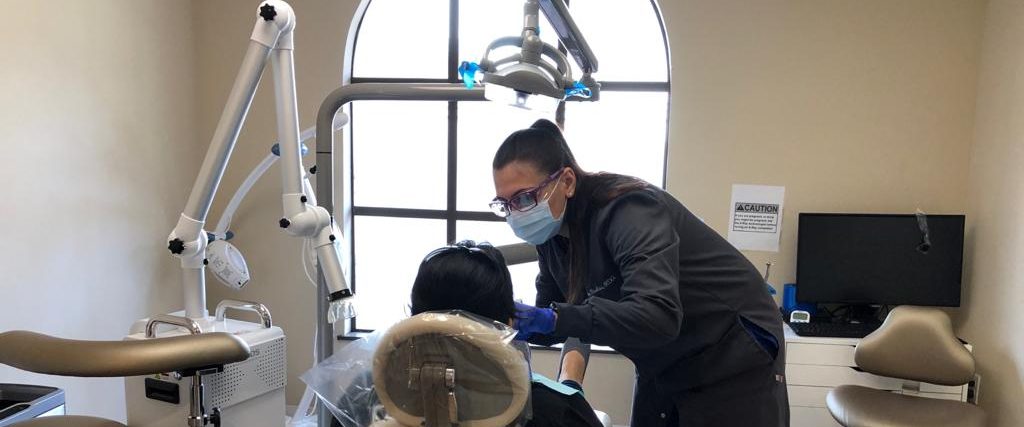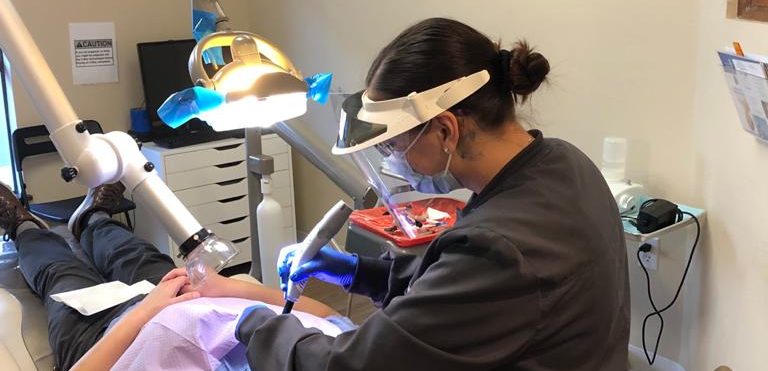Date : 14/05/2020
Your Caring Dentist wants you to live your best, healthiest life. And that means avoiding gum disease.
Gum disease affects more than just your smile. It can increase your risk for five major health problems, including diabetes, cancer, and heart disease. The good news is, it’s easy to prevent gum disease. In addition, even if you’ve already developed a problem, your dentist can help you get your oral health back on track.
What Is Gum Disease?
Gum disease, or periodontitis, is a group of diseases caused by microorganisms living on the teeth. The body’s over-aggressive immune response to these microorganisms can cause inflammation of the gums. Gingivitis is the first stage of gum disease, and the most easily cured. Symptoms include red, swollen, or bleeding gums, pain or bleeding while brushing, bad breath, and receding gums. If you have any of these symptoms, it’s important to contact your dentist, so that they can put together a treatment plan. If you let it go untreated, it could lead to tooth loss or worse. How much worse? Consider the following.
Gum Disease Increases Your Risks In These 5 Areas
Gun disease has a devastating effect on your health. In addition to having problems in your mouth, you also have an increased risk of some of the deadliest killers known to man.
1. Heart attack, stroke, and lung disease
You might have heard about the connection between gum disease and heart disease. The theory is that when your body’s immune system overreacts to the microorganisms that cause gum disease, this causes inflammation. If the inflammation doesn’t clear up properly, it can get into the bloodstream and cause damage to the blood vessels. This, in turn, damages the heart and brain over time. As a result, this can lead to heart attacks and strokes. A recent review of studies suggests that gum disease may increase your chances of heart disease by 20 percent.
In addition, it looks like periodontitis can lead to respiratory problems as well. How? Well, some researchers believe that people with periodontal disease may breathe in pathogens from infected gums. These pathogens then infect the lungs. Another study has shown that pathogens that usually infect the lungs can colonize dental plaque and cause an infection that way. Either way, gum disease can be bad news for your lungs.
But there’s also good news. The American Journal of Preventative Medicine reports that people who receive treatment for periodontal disease have better treatment outcomes for a variety of other health problems. And that includes heart and lung problems.
2. Premature/low birth weight babies
Did you know that a mother’s gum disease can cause babies to be born prematurely, and weighing less than they should? A recent study from the University of Alabama shows that women with gum disease are up to seven times more likely to give birth to a premature, low weight baby.
Periodontal infection affects several organ systems. These include the cardiovascular system, the endocrine system, the reproductive system, and the respiratory system. Recent research suggests that the infection from gum disease can get into the bloodstream and target a growing baby. And this can cause low birth weights and even premature birth.
According to Dr. Michael Williams, DMD, PC, women who have experienced oral disease are more likely to develop gingivitis during pregnancy. In addition, it usually develops in the second or third month of pregnancy. If you are pregnant and experience the symptoms of gum disease, see your dentist immediately.
3. 93 percent of people with gum disease are at risk for diabetes.
Many people know that diabetes can cause or worsen gum disease. When your body is unable to digest sugars, it can cause many different oral problems. But did you know that, in addition, gum disease can raise the level of sugar in your blood? It’s true.
The American Dental Association reports that people with severe periodontal disease have higher long-term blood sugar levels. This can lead to a greater risk for Type 2 Diabetes. In addition, people who already have Type 2 Diabetes may have a harder time controlling it, if they have periodontal disease. How much of a risk is it? Well, a study at New York University found that 93 percent of people with advanced periodontal disease were at high risk for developing Type 2 Diabetes.
Gum disease is easy to prevent, and it’s treatable. Protect your health. See your dentist regularly.
4. The cancer connection: pancreatic and kidney cancer
Pancreatic cancer is a terrifying disease. It progresses quickly, and more often than not, by the time your doctor detects it, it’s too late. Fewer than 10% of people diagnosed with pancreatic cancer will survive five years past their diagnosis.
An article in the Journal of American Medicine links two different kinds of periodontal bacteria to the development of pancreatic cancer. In fact, study participants with one of two bacteria had a 50-59 percent greater risk of developing pancreatic cancer over those who didn’t have them. A study by the Harvard School of Public Health raises that risk to 63 percent.
And that’s not all. Researchers at the Imperial College of London found a link between gum disease and numerous other cancers. These include cancers of the kidney, lung, and blood. They speculate that inflammation of the gums is mirrored elsewhere in the body. In addition, they believe that the bacteria that cause periodontal disease could cause problems in other parts of the body.
5. Another cancer connection: gum disease, bone loss, head cancer, and neck cancer
Head and neck cancers are the tenth most common category of cancer. In addition, they’re the seventh most common cause of cancer death. And many studies have shown a link between gum disease and various cancers of the head and neck. First, the bacteria associated with gingivitis have been found in large quantities in head and neck tumors. In addition, researchers believe that the inflammation from periodontal disease releases toxins into the blood. These toxins, in return, can release cancer-causing agents.
One study showed that subjects with bone and tooth loss from gum disease were 4.6 times more likely to develop a head or neck cancer. And it’s been speculated that each millimeter of bone loss due to chronic gum disease is associated with a more than four times higher risk of head and neck cancer.
Am I At Risk for Gum Disease?
You may be at a greater risk for gum disease if you:
- Smoke or chew tobacco
- Have diabetes
- Are taking certain medications like birth control pills, steroids, anticonvulsants, calcium channel blockers, and chemotherapy
- Have crooked teeth
- Wear poorly fitting dentures, bridges, or other dental appliances
- Have broken fillings
- Are pregnant
- Have a family history of gum disease
- Have compromised immunity, for example from HIV/AIDS
In addition, if you have any of the following symptoms, make an appointment with your dentist.
- Bad breath
- Red, painful, or swollen gums
- Pain chewing
- Sensitive teeth
- Gums that bleed when you brush or floss your teeth
- Gums that have pulled away from the teeth
- Loose teeth
- A change in how your teeth fit together when you bite
- Pus between teeth and gums
Periodontal disease can be painful and frightening. But remember, there are lots of treatments available from your dentist. And you can get help, even if you don’t have dental insurance.
What Can You Do About Gum Disease?
First, if your teeth and gums are healthy, keep them that way. Develop an oral hygiene routine that includes:
- Brushing your teeth at least twice a day with a fluoride toothpaste. One of those times should be right before bed
- Flossing or using interdental brushes at least once a day
- Seeing your dentist twice a year
- Eating a healthy diet, and avoiding excessive sugary snacks, gum, and soda
Second, invest in dental insurance. It probably doesn’t cost as much as you think. In addition, if you need expensive treatments down the road, it can save you a lot of money.
Finally, if you have any of the symptoms of gum disease, make an appointment with a dentist right away.
Dental programs for a fixed income
Even if you have no dental insurance, you still have a number of options. You can:
- Contact your state’s dental association for names of dentists who work on a sliding scale with uninsured patients. You can get your state association’s contact information from the ADA website.
- Contact your local dental school. Often dental schools provide inexpensive dental care to give their recent graduates the hours they need to pursue licensing.
- Low-income patients may also qualify for services at a free dental clinic.
- In addition to dental insurance, there is dental discount insurance. This often costs less than dental insurance. But instead of paying for all dental expenses, you receive services at a discounted rate. This is also called a dental savings plan.
How to find a good dentist
First, if you have dental insurance take a look at the list of dentists in your network. Insurance generally will not pay for services from out of network dentists. Make a short list.
Next, visit the ADA website, and make sure your choices are ADA members. The American Dental Association has a strict code of professional and ethical conduct that its member dentists must follow.
Finally, visit the dental offices on your list. Find one where you feel comfortable. Is the staff pleasant? Do they seem well informed? Are they happy to answer your questions? Is the office clean and well organized? Only when you are completely satisfied, should you make an appointment.
You Only Have One Set of Gums
It’s becoming clear that dental health is more important than anyone originally imagined. But the good news is, if your oral health is already good, it’s easy to keep it that way. And if you’re experiencing the beginnings of gum disease, help is available, with or without insurance. Take care of yourself. And make an appointment with your dentist today.




